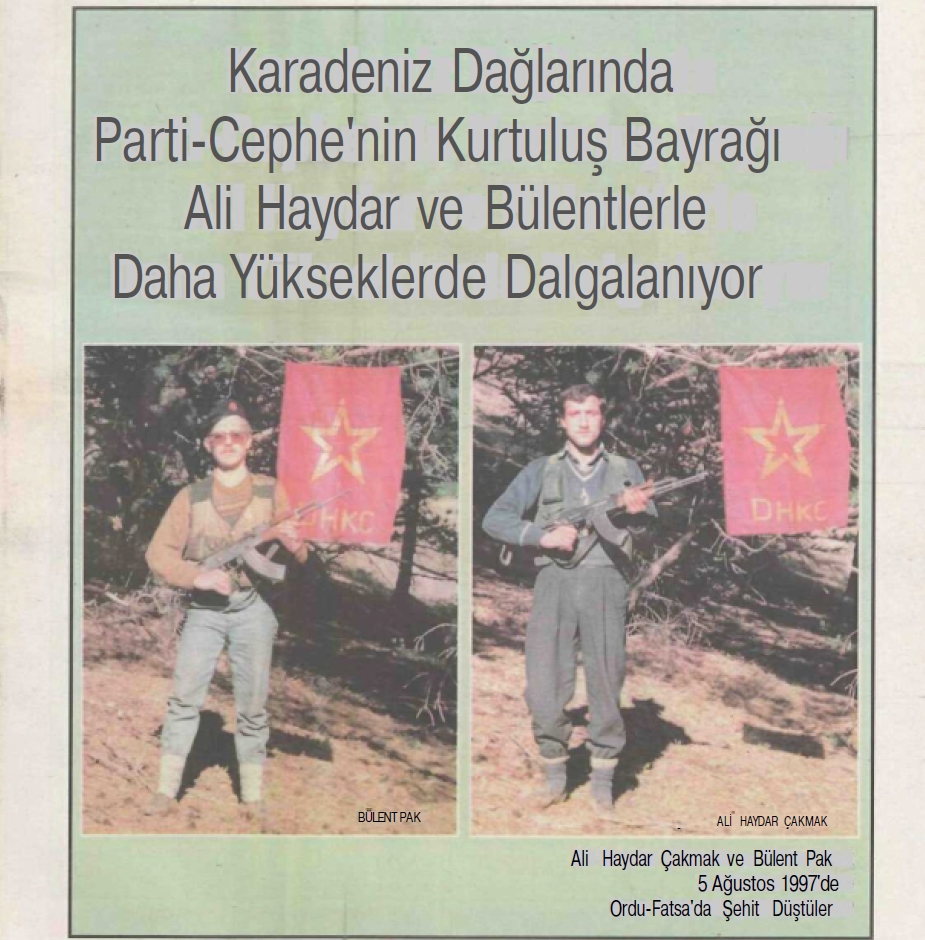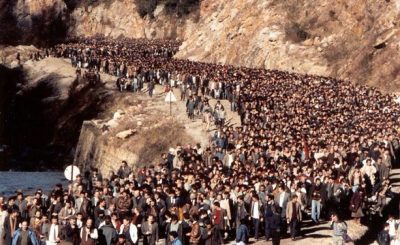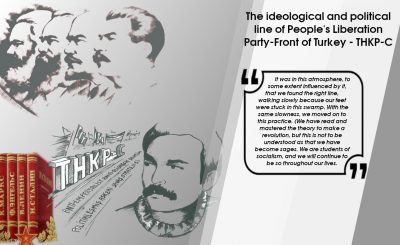Although our comrades were surrounded, they said “our flags will wave over all corners of this land.” The defenders of this inheritance, the supporters of the Party-Front, have shown their ties to this inheritance under all manner of conditions. The have chosen as battlegrounds cities, mountains, valleys, everywhere where our people are, every patch of land. From Kurdistan to central Anatolia, from central Anatolia to the mountains of the Black Sea they have spread themselves.
Whatever might be claimed by the counterrevolution, chauvinism and the progressively decaying government, namely that the supporters of the Party-Front could never again reach here, the Party-Front proved the contrary, by waving the banner of freedom in the mountains. Even if the price is hundreds or even thousands of dead, all the mountain tops and forest depths that they say we cannot reach belong to us. The supporters of the Party-Front reached the surf of the Black Sea, falling and then immediately getting up again. Despite the counter-propaganda of the fascists, the people have begun to know the guerrillas and learned to understand them.
The propaganda of the enemy was made ineffective. This dignity was borne by people like Bahattin, Ali, Haydar and Bulent. Everything was built up from nothing. There were times when the guerrillas had to march through the mountains for days without recognising even a small portion of the ground they were traversing. Under fire from the enemy, they had to learn to escape while going without food or water. They learned to use everything as a weapon against the enemy as part of the practical aspects of guerrilla life, and to survive they learned to keep moving over ground. In order to spread the struggle, they had to get to know the mountains of the country, the people and the enemy. Knowing this also meant knowing ourselves. They were conscious of the high price, they knew that their lives would be weighed in the balance.
On the morning of August 5, 1997 a small unit of the Black Sea’s Recai Dincel armed propaganda unit, which had set itself the task of spreading to even the remotest part of the region, was surrounded by the enemy near the village of Cuteli not far from Ordu, the capital of Fatsa province. Despite the attacks of the enemy, using hundreds of soldiers and heavy weapons, the unit continued our tradition of fighting on to the last bullet without surrendering. The people of the Black Sea heard once more the voice of the weapons of the Party-Front, just as they had heard the sound of Kizildere and the weapon of Bahattin.
An end was put to the falsification of revolutionary history by fascism.
From now on in the mountains of the Black Sea the sound of liberation will not be silenced. The struggle goes on along the path that began in Kizildere. The fact that Ali Haydar Cakmak and Bülent Pak have fallen is not a blow by fascism against the guerrillas, on the contrary, it shows how the enemy has no way
out, and that the enemy is powerless against the guerrillas is shown by the fact that we were able to reach areas the enemy said we could never reach.
ALI HAYDAR CAKMAK (VEYSEL)
 The commander of the unit, born in 1973 in Malatya/Arguvan, Kurdish origin, born into poor peasantry. Because of poverty he moved to Istanbul with his family. He grew up in the Gazi slum area. There he got to know every aspect of the system: he recognised what had to be done against it and he was conscious of the need to become a revolutionary. He understood that a dignified and honourable life was
The commander of the unit, born in 1973 in Malatya/Arguvan, Kurdish origin, born into poor peasantry. Because of poverty he moved to Istanbul with his family. He grew up in the Gazi slum area. There he got to know every aspect of the system: he recognised what had to be done against it and he was conscious of the need to become a revolutionary. He understood that a dignified and honourable life was
only possible if one was a revolutionary.
To be able to go to school he was forced to take on work on the side. In 1989, when he was in secondary school, he got to know the movement. The revolutionary movement was the answer to very many questions for him. He was trained by outstanding comrades like Ekrem Akin Savas, Faruk Bayrakci and Veysel Beysuren.
Aged 17, he was a committed Dev Genc militant. In 1992 he took on tasks in the Dev Genc militia. He always felt hatred towards the enemy.
This hatred pushed him on, the demand he made on himself for the revolution became greater and greater. Even when his connections to the movement were interrupted and he was completely on his own, he knew what had to be done and acted independently.
After the June 12 operation, he did not even need an order to tear a weapon from the enemy’s hands and call him to account. He was arrested and tortured on 20 occasions. Each time he came back out with his head held high. He knew captivity but he always returned to the struggle.
He was in the struggle, he was tortured, he was a prisoner. He, Ali Haydar, who grew up in Gazi, carried out the tasks allotted to him and was connected to the people and his comrades as befitted a supporter of the Party-Front who was the target of the enemy’s attack.
He experienced the attack of fascism on march 12 and a peoples upprising.
WE WILL CALL THE ENEMY TO ACCOUNT: “THE POLICE STATION IS A
TARGET”
“The police station is a target” was the slogan used in an uprising by thousands of inhabitants of Gazi, the slogan of the demand for justice. Ali Haydar collected his comrades together with all speed and urged the people to rise up. Ali Haydar was at the head of the rebellion whose participants yelled “the police station is a target”. On the first day that the committee was formed, he represented the Party-Front.
From the start of the uprising to the finish he ran from barricade to barricade. At every point of the people’s uprising his efforts, diligence, courage and leadership skills were obvious.
He buried his fallen comrades on the spot where they had grown up, where they had come to know the struggle and the enemy. Then he took up tasks in the Ibrahim Yalcin armed propaganda unit. He fought under commander Sibel Yalcin.
In August 1995 he became acquainted with the struggle in the mountains. There he learned to be a rural guerrilla. He saw commanders, martyrs and traitors. But he lived gripped by the desire to spread and make greater the struggle. He fell with the joy of knowing that he had reached the mountains of the Black Sea region. He kept his word to his armed friends in the Party-Front, the martyrs of Gazi.
He wrote a page in the history of his fallen comrades in Gazi who he buried with his own hands, a history that stretched from Gazi to central Anatolia and from central Anatolia to the Black Sea.
BÜLENT PAK (SINAN)
 The deputy commander was born in 1958 in Eskisehir and was of Turkish nationality. Because his father was a soldier he spent his youth in various places. As a secondary school pupil he made a living working on building sites as an electrician and in electrical goods shops.
The deputy commander was born in 1958 in Eskisehir and was of Turkish nationality. Because his father was a soldier he spent his youth in various places. As a secondary school pupil he made a living working on building sites as an electrician and in electrical goods shops.
We can say that the history of the Party-Front and the history of Bülent were the same. In 1974 he began studying. In the same year, after the execution at Kizildere, the years began in which the ideology
and politics of the THKP-C came under every conceivable form of attack, and every attempt was made to wipe out its history. Against open and concealed enemies the young militants, who wanted to carry on the legacy of the Party-Front in every place they found themselves, began to take steps to organise the Party-Front.
The embryo of our current movement, the Kurtulus (Liberation) group, was born in these years. Bülent, one of those responsible for the Academy of Architects and Engineers and the city district of Besiktas, took his place in this activity.
When there were attacks by civil fascists against youth and the inhabitants of shantytowns he was always at the forefront of efforts to repel them. In the Dev Genc phase after 1974 and in defence and organising to counter fascist attacks in Besiktas, Bülent played an important role. When the Devrimci Yol renegades came out into the open in 1978, Bülent played an active role in fighting them. He was one of those who took part in the meeting where Devrimci Sol was founded.
He was one of the leading cadres of Dev Genc and also took on tasks as a fighter in the “Units to Counter Fascist Terror”, and he showed special energy in this. We can find the traces of his activity in dozens of clashes in the Besiktas area involving Dev Genc. Because of people like Bülent the fascists were never able to get the upper hand in the schools and streets of Besiktas. They did not spread their influence in the area, they could not engage in repression and no fascist strongpoints remained. Dev Genc became a nightmare for the fascists.
Bülent took up the long-term campaign of struggle by Devrimci Sol after the September 12, 1980 military coup, with the slogan “the junta cannot force 45 million people to surrender”, as a leader of the masses, a fighter and a creative person in every situation. His efforts and activity showed themselves in many
small and large operations against the enemy. The remote-control bombs used against the cars of the torturers in Fulya Deresi in Besiktas were his contribution.
The enemy still remembers them. When we suffered defeats, we kept on fighting. Bülent was one of those who kept on fighting. He became a prisoner but continued to fight. Captivity was not the end of the struggle. He was well to the front in any resistance. He was one of the volunteers in the second Death Fast team in 1984.
HE WAS A MASTER OF CREATIVITY.
The dream of freedom for every prisoner combined with the inclination to struggle developed into an unquenchable passion. Bülent was one of those who lived their life gripped by this passion. And this
passion, combined with creativity, showed itself in the “freedom actions” of which he was one of the architects and which amazed even the enemy.
The organisation of freedom actions from the cells of Ankara and Buca, whether known or unknown, cannot be discussed in terms of leading roles and creativity. Bülent became a legend in this sphere. To his mind, there were no obstacles that could not be overcome. Without wanting anything for himself he spent no day without a rope around his neck without fighting with great energy for the freedom of his comrades.
After his imprisonment ended, he was again in the thick of battle. “When I am separated from our movement for a day I feel like an orphan,” he said. The movement was everything for him. He did not have such a strong attachment even to his family. 1990 was the beginning of our surge. As a part of this, he was one of the first cadres who worked at our Middle East camp to develop city and rural guerrillas.
With a limited number of people it was planned to simultaneously build the camp and start using it for instruction. Bülent made the camp ready in three months together with some friends so it could be used for training, by working day and night, despite some who said it would not be ready in a year. He was one of the instructors in the camp. In July 1991 he returned to Turkey with a quantity of weapons and equipment and was again arrested.
After a short period of imprisonment, in 1992 he took up the task of organising guerrillas in the mountains of the Aegean. In 1993 he was arrested in the Aegean. The war went on. In the existence of a revolutionary there is no tiredness or exhaustion. They never accepted imprisonment as fate.
On July 17, 1995 he escaped together with three friends, the prison walls of Buca opening into the mountains of Sivas. When he died under the command of Ali Haydar, he had fought at every point of the Party-Front’s history. Even when he showed shortcomings, he knew that with persistence one could get back on one’s feet, and filled his whole revolutionary life with the struggle and left his history and personality as a legacy.
WE WILL LET THEIR MEMORIES LIVE ON BY SPREADING GUERRILLA WARFARE OF THE BLACK SEA AND EVERYWHERE IN THE COUNTRY.
DEVRIMCI HALK KURTULUS CEPHESI
RAVOLUTIONARY PEOPLES LIBERATION FRONT
Notes:
1. The reason why Ali Haydar and Bülent fell is that in the conflict zone a man named Yusuf Deniz had been arrested.
2. The TV report on August 7, 1997 showed a training camp of the DHKP-C from the
year 1990-91. The TV report was propaganda against us. we have no camp in Syria. Moreover, the reports from August 8, 1997 about a fighter being murdered by the DHKP-C are a slander. The truth is that in Tokat/Sivas an enemy operation had been under way for some time. Kasim Tepe and Sevda Guler saw this as a chance to go over to the enemy. While doing that they were caught and punished with death.
Source: Devrimci Sol(Revolutionary Left) magazine, September 1997.



